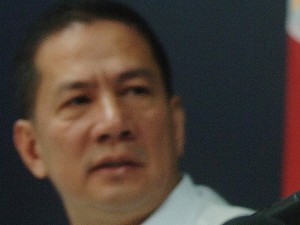MANILA, Philippines – The Department of Foreign Affairs (DFA) on Tuesday said that it would be persistent in summoning the Cambodian envoy and demand an explanation for what it described as “strong accusations” against the Philippines and Vietnam.
“We are going to summon the Cambodian ambassador to ask him to explain what he meant when he stated that the ‘inflexible and non-negotiable position of two countries of ASEAN is dirty politics,'” Raul Hernandez, DFA spokesperson, said in an interview with reporters.
“We are trying to find out the real meanings of these statements because these are rather strong accusations that we are playing dirty politics,” he added.
Hernandez said that about 10:30 a.m. Tuesday, a note verbale was handed to Tan Chanadaravuth, Second Secretary and Consul of the Cambodian Embassy in the Philippines, asking the Cambodian ambassador to explain the details he divulged. He said the meeting lasted for about 30 minutes.
He said that the Cambodian ambassador was summoned Monday and Tuesday but that he was “indisposed” to come.
“We hope to receive a reply but for now he is indisposed but we will keep on summoning him until he is able to come to the Department of Foreign Affairs to explain these accusations,” Hernandez said.
Hernandez was reacting to an article published in the letter to the editor of a local broadsheet (The Philippine Star) authored by Hos Sereythonh, Cambodian ambassador to the Philippines. In his letter entitled Communiqué only through full consensus, Hos accused the Philippines and Vietnam of playing dirty politics in trying to blame the Cambodian Chair “for what essentially was the inflexible and non-negotiable position of the two countries of ASEAN (Association of South East Asian Nations).”
The Association of South East Asian Nations came under direct scrutiny after it was not able to issue a joint statement for the first time because of a conflict between China and some ASEAN-member states’ claims on the West Philippine Sea.
Hos, in his letter, also reacted to the article entitled What happened in Phnom Penh written by Undersecretary Erlinda Basilio, saying that based on Basilio’s explanation of fiction and facts, she has “tried to manipulate, distort, and exaggerate in order to make her case.”
Hernandez was quick to defend Basilio, saying that Basilio was a professional diplomat with an unblemished record of nearly 50 years of service to the country.
“More importantly, Undersecretary Basilio was present in all the meetings in Phnom Penh. The Cambodian Ambassador was not,” Hernandez said.
Hos, in his letter, also said that Cambodia, the Chair of the ASEAN, was not to blame for the non-issuance of the ASEAN joint statement, saying that Cambodia wrote to all the ASEAN Foreign Ministers to ask for responses to the issue but that, “after waiting for several weeks it was clear that ASEAN had no consensus on the Scarborough Shoal” dispute.
But Hernandez, in the interview, said that the Cambodian Chair appointed a committee, including the Philippines and Vietnam, which had full authority if it could reach a consensus on a final draft.
“Upon a series of many negotiations, at least five final drafts achieved a consensus. Notwithstanding authority granted the committee, all final drafts were disapproved by the Chair,” Hernandez said.
Hernandez added that they wanted to ask Hos to authorize the release of evidence to the public, which he said should end all speculation on what really happened in Phnom Penh.
“We will also ask where the ambassador obtained the information on the events as narrated in his letter since these are not consistent with the records of the ASEAN meetings,” he said.
When asked by reporters if it was possible for Cambodia to ignore the said appeal, Hernandez said, “Well that will be an issue. That will be an issue for him.”
